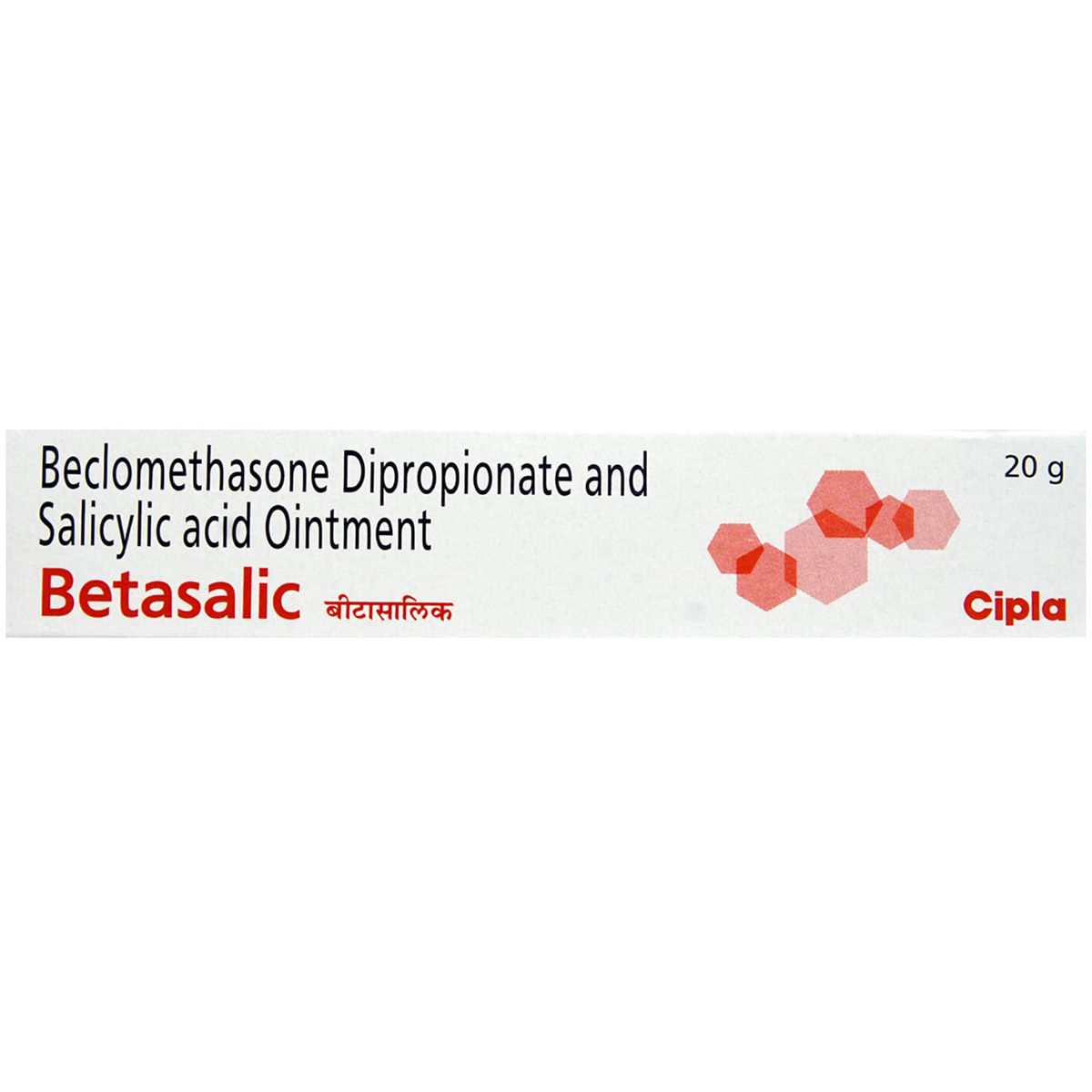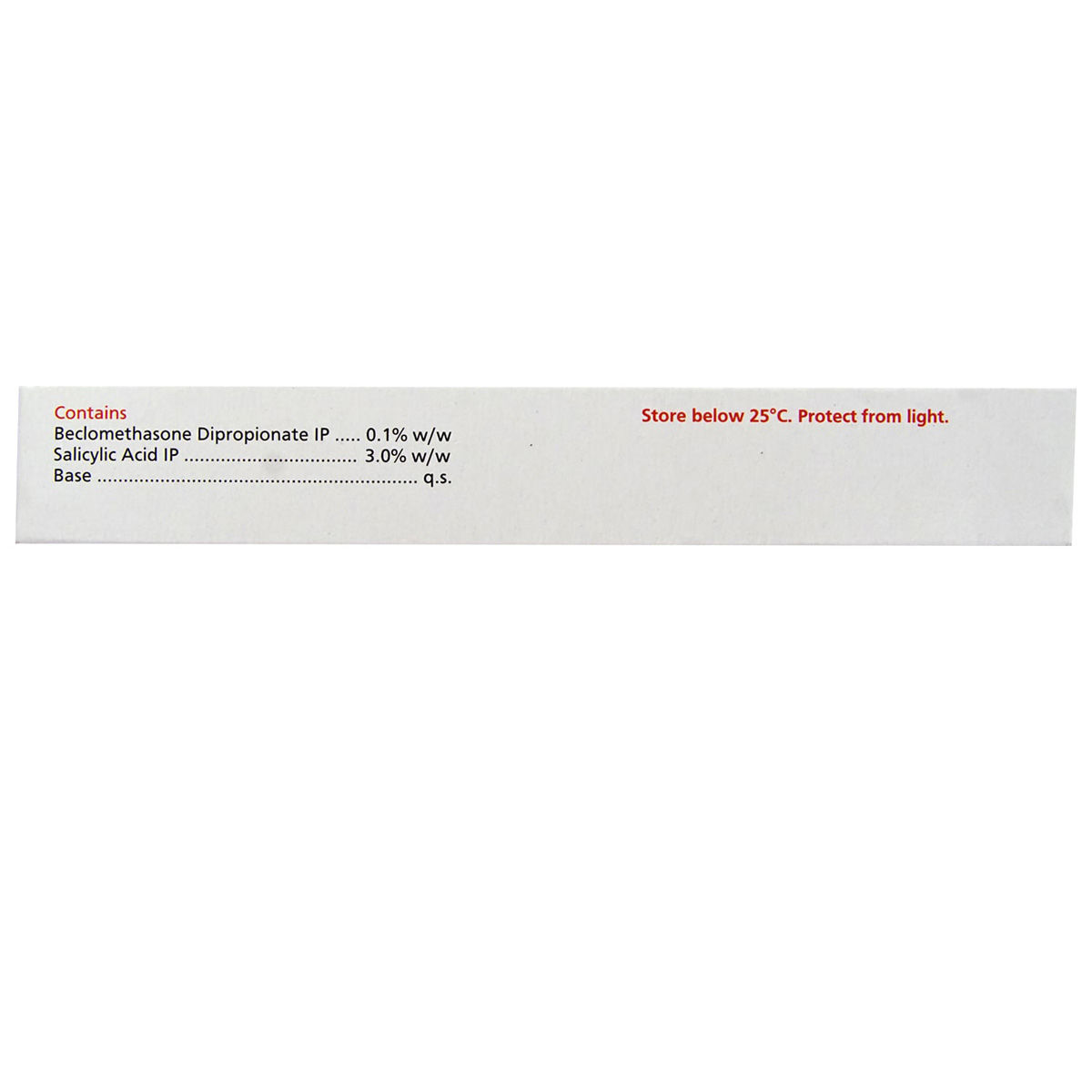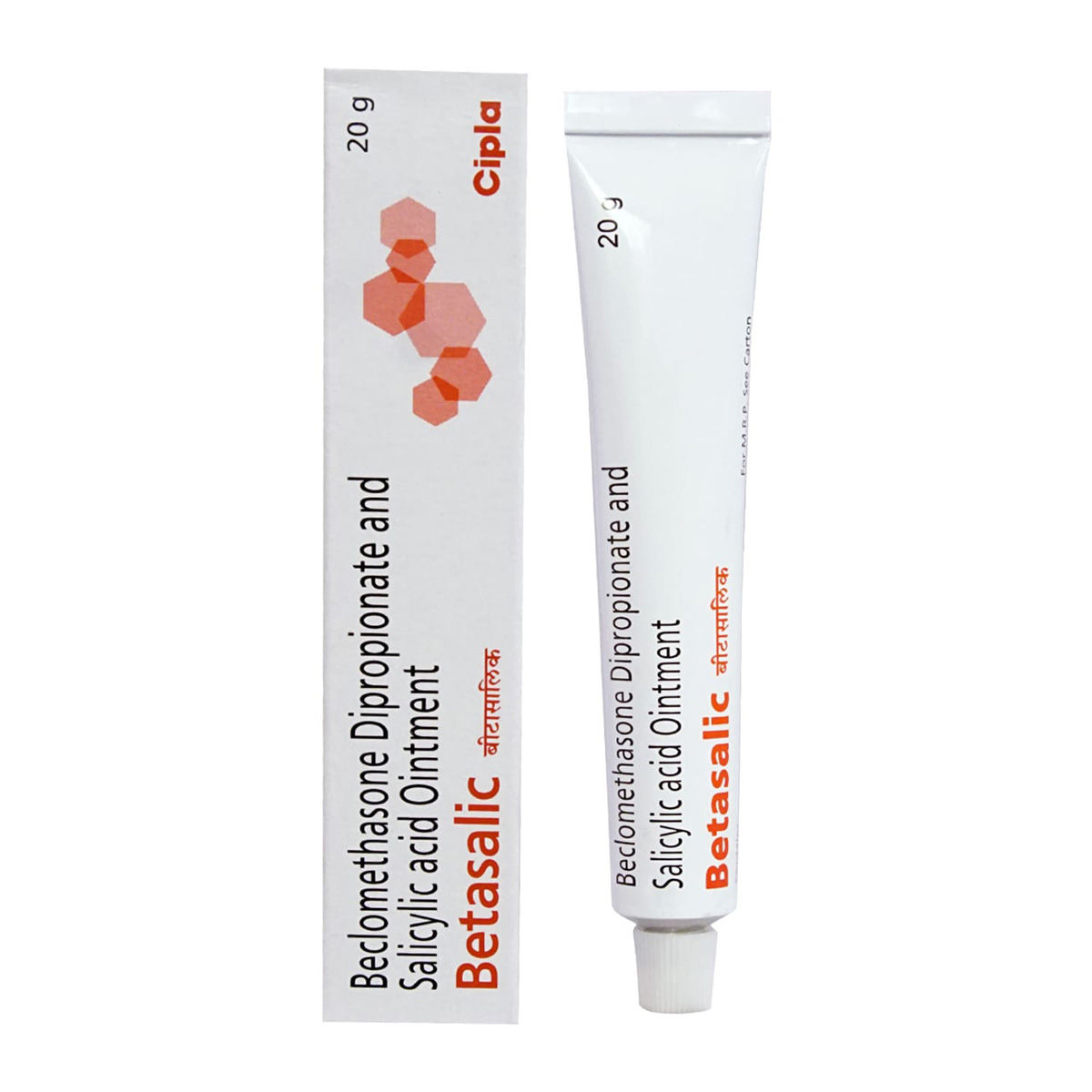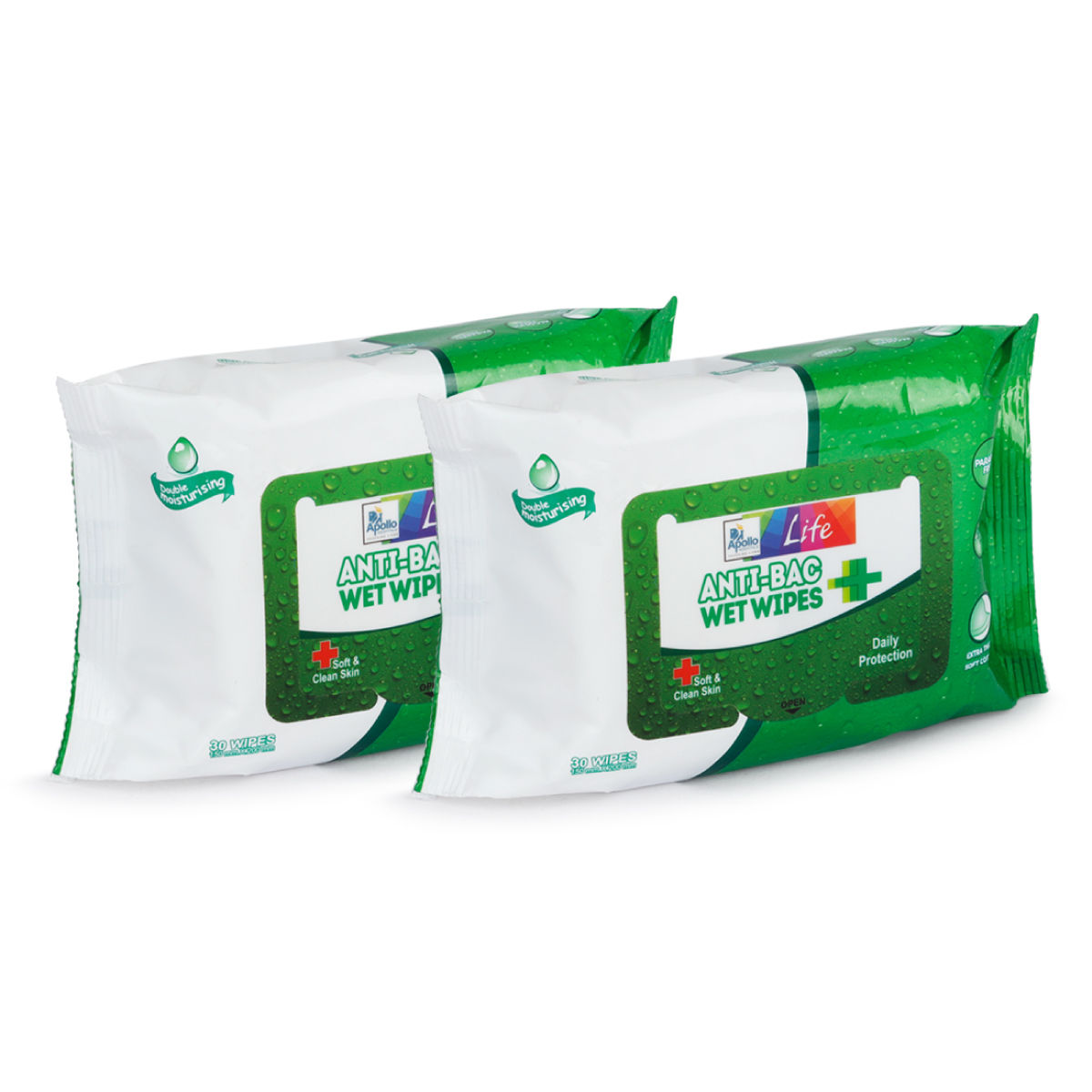Betasalic Ointment 20 gm
₹95.4*
MRP ₹106
10% off
₹90.1*
MRP ₹106
15% CB
₹15.9 cashback(15%)
Free Delivery
With Circle membership
(Inclusive of all Taxes)
This offer price is valid on orders above ₹800. Apply coupon PHARMA10/PHARMA18 (excluding restricted items)
Know Your Delivery Time
Provide Delivery Location





Available Offers
 Prescription drug
Prescription drugWhats That
 25 people bought
25 people bought 
Secure Payment

India's Most Trusted Pharmacy

Genuine Products
Composition :
Manufacturer/Marketer :
Consume Type :
Return Policy :
Expires on or after :
About Betasalic Ointment
Betasalic Ointment is a dermatological medication that used to reduce swelling, itching redness and dead skin cells caused due to specific skin problems such as psoriasis (scales and itchy, dry patches) and eczema (itchy, cracked, swollen or rough skin). The swelling of the skin occurs when an allergic reaction or skin irritation releases several substances in the skin that widens blood vessels and cause itching, redness, pain and swelling in the irritated area.
Betasalic Ointment contains Beclometasone (steroids) and Salicylic acid (anti-inflammatory/keratolytic) that works together by reducing the amount of inflammatory chemicals your body makes thereby stopping the body’s natural immune response, which helps to control swelling and inflammation. When the skin reacts to any allergens, such chemicals are released typically. Salicylic acid belongs to the class of keratolytic agents that works by breaking down a protein known as keratin (that forms part of skin structure) and removes dead skin cells and softens skin. Also, it enhances beclometasone absorption into the skin.
Betasalic Ointment is only for external use. In case Betasalic Ointment comes in contact with these areas accidentally, rinse with water thoroughly. Some people may experience side effects like skin rash, inflammation (swelling and redness) of hair follicles, blistering, itching, swelling, stinging or burning sensation at the site of application. Most of these side effects of Betasalic Ointment do not require medical attention and gradually resolve over time. However, if the side effects persist and/or worsen, please consult your doctor.
If you are known to be allergic to Betasalic Ointment or any other medicines, please tell your doctor. If you are pregnant, planning for pregnancy or a nursing mother, it is advised to consult a doctor before using Betasalic Ointment. Do not use Betasalic Ointment in more than prescribed doses, on large areas of the body or for a prolonged time as it may change the levels of some hormones in the body. Do not wrap or cover the treated area with plasters or bandages. Avoid smoking or going near naked flames as the fabric (bedding, clothing, dressings) that is in contact with Betasalic Ointment catches fire and burns quickly.
Uses of Betasalic Ointment
Directions for Use
Medicinal Benefits
Betasalic Ointment is a combination of two drugs, namely; Beclometasone and Salicylic acid. Betasalic Ointment is used to reduce swelling, itching redness and dead skin cells caused due to certain skin problems such as psoriasis (scales and itchy, dry patches) and eczema (itchy, cracked, swollen or rough skin). Beclometasone is a corticosteroid that works by acting inside skin cells and inhibits the release of certain chemical messengers in the body that cause redness, itching and swelling. When the skin reacts to any allergens, such chemicals are released normally. Salicylic acid is a keratolytic agent that works by breaking down a protein known as keratin (a component of skin structure) and removes dead skin cells and softens skin. Also, it enhances beclometasone absorption into the skin.
How Betasalic Ointment Works
Storage
Side Effects of Betasalic Ointment
- Skin rash
- Inflammation (swelling and redness) of hair follicles
- Blistering
- Itching
- Swelling
- Stinging or burning sensation at the site of application
What if I have taken an overdose of Betasalic Ointment
Drug Warnings
If you are known to be allergic to Betasalic Ointment or any other medicines, please tell your doctor. If you are pregnant or a nursing mother, it is advised to consult a doctor before using Betasalic Ointment. Do not use Betasalic Ointment in more than prescribed doses, on large areas of the body or for a prolonged time as it may change the levels of some hormones in the body. Do not wrap or cover the treated area with plasters or bandages. Avoid using Betasalic Ointment for more than 5 days in children and on the face. Avoid smoking or going near naked flames as the fabric (bedding, clothing, dressings) that is in contact with Betasalic Ointment catches fire and burns easily. If you have rosacea (redness and often red, small, pus-filled bumps on the face), psoriasis, acne, dermatitis (redness and swelling of the skin) around the mouth, chickenpox, cold sores, nappy rash, genital itching or other skin problems, glaucoma, cataracts, diabetes, adrenal gland, liver or blood circulation problems, inform your doctor before using Betasalic Ointment. This medicine should not be used in bacterial/fungal infections, or napkin eruptions, without suitable concomitant anti-infective therapy. In rare cases, adrenal hormone suppression may also occur with Betasalic Ointment, especially in infants and children.
Diet & Lifestyle Advise
- Eat foods rich in quercetin (a flavonoid) such as apples, cherry, broccoli, spinach and blueberries.
- Consuming food rich in probiotics helps in developing the immune system against allergies.
- Limit intake of food that might trigger allergies such as dairy products, soy, eggs, and nuts.
- Avoid consumption of foods with excess sugar as it may flare-up inflammation.
- Include fruits, vegetables, whole grains, healthy fats and fish in your diet.
- Reducing stress and maintaining a regular sleep pattern would be helpful.
- Avoiding getting in contact with harsh soaps, detergents and rough fabrics.
Habit Forming
Therapeutic Class
Alcohol
Caution
Interaction of Betasalic Ointment with alcohol is unknown. Please consult a doctor before consuming alcohol while using Betasalic Ointment.
Pregnancy
Caution
Betasalic Ointment is a Category C pregnancy drug and is given to a pregnant woman only if the doctor thinks benefits outweigh risks. So if you are pregnant or planning for pregnancy, please consult a doctor.
Breast Feeding
Caution
Do not apply Betasalic Ointment on the breast area or nipple before breastfeeding the baby. Betasalic Ointment is given to breastfeeding mothers only if the doctor thinks benefits are greater than risks.
Driving
Safe if prescribed
Betasalic Ointment usually does not affect your ability to drive or operate machinery.
Liver
Caution
Betasalic Ointment should be used with caution in patients with liver diseases. The dose may have to be adjusted by your doctor.
Kidney
Caution
Betasalic Ointment should be used with caution in patients with kidney diseases. The dose may have to be adjusted by your doctor.
Children
Caution
Please consult your doctor before using Betasalic Ointment in children.
FAQs
Country of origin
Manufacturer/Marketer address
Customers Also Bought
Disclaimer
Author Details
We provide you with authentic, trustworthy and relevant information











